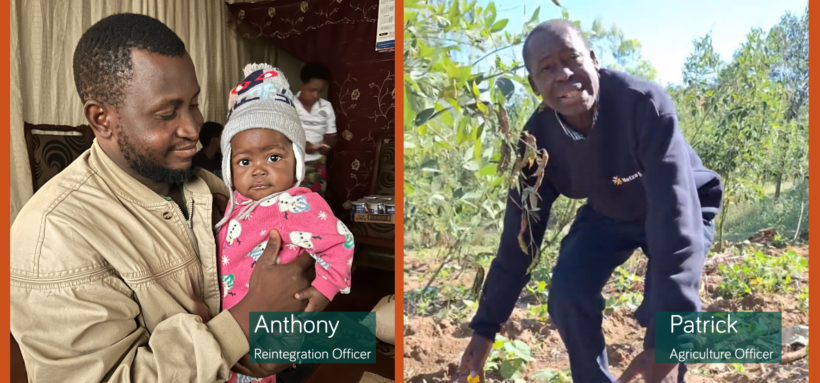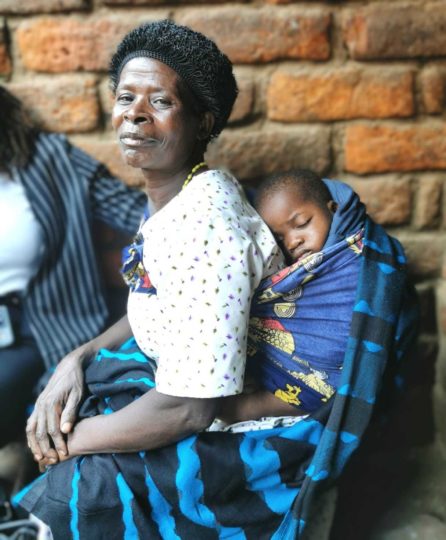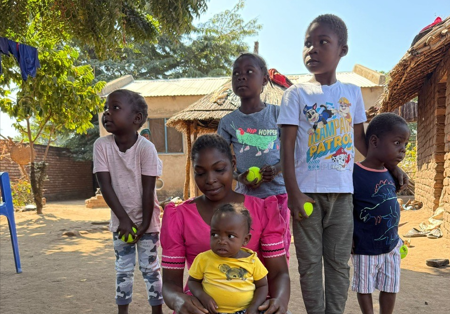When you sit down with Anthony and Patrick, Open Arms’ Reintegration Officer and Agriculture Officer, one thing becomes immediately clear: everything starts with the child. But not just the child—also the family, and the community that surrounds them.
Over the past year, Open Arms has been undergoing a quiet but powerful transformation. What once centred around residential infant homes in Blantyre and Mangochi is now shifting toward something more sustainable, more empowering, and more rooted in the realities of life in Malawi: community-based care and the graduation programme.

“In the past, we focused on the child in the Infant Home,” Anthony explains. “But now, we’re focusing on the child in the family.”
Instead of isolating care to a single child, we now support entire households. That means providing fortified milk and porridge not just for the vulnerable baby, but enough nutrition for the whole family. It’s what is known as a “collateral benefit”—because when the family thrives, the child thrives.
The ambitious goal for community-based care has always been to support 100 children annually, doubling our previous impact, where we could only care for up to 50 children in the Infant Homes. This marks a significant step forward, and plans are in place to continue expanding and reach more children in the near future.
“Every child deserves a family,” Patrick adds. “That’s not just our belief—it’s government policy, and it’s backed by international law.”
The reasons for the transition from institutional care to family-based care are both emotional and evidence-based. Children raised within families are able to build attachment to their primary caregivers which helps to build trust, offers warmth, stability, and a sense of belonging and culture. All this contributes to their social and emotional development.
The graduation programme is designed for families living in extreme poverty. It’s not about handouts—it’s about empowerment. Families receive agricultural support, training, and tools to grow their own food and eventually generate income.
“At first, it was hard,” Patrick admits. “We used to give them maize. But when we stopped, they were confused. They expected it. But once they understood the goal, they embraced it.”
“Farming is a business,” Patrick says. “But first, we make sure they have enough to eat. Then they can sell the surplus.” The team provides seeds, fertiliser, pesticides, storage bags, and training. They also help families understand market timing—selling maize in November, for example, can double the income compared to selling in August.
Matthew’s grandmother is now one of their top-performing farmers. She even rented extra land to reach a full hectare and has now grown enough maize to feed her entire family for the year. “She’s exceptional,” Anthony says with pride. “She’s a model of what’s possible.”

Currently, 25 families in Blantyre and another 25 in Mangochi are enrolled in the graduation programme. That might not sound like a lot—but the impact is deep. In Blantyre alone, those 25 families include 137 individuals.
“We’re not just supporting a child,” Anthony says. “We’re supporting a whole ecosystem.”
And that’s intentional. “We want to focus on fewer families - but do it well. Once they graduate, we move on to others. It’s about quality over quantity.”

The need is great in Malawi. From November to January, referrals surged as families ran out of food and children became malnourished. Open Arms works closely with government social workers to assess each case and prioritise the most vulnerable.
Starter packs are given to families in crisis—formula, food, clothes, mosquito nets—while paperwork is processed. But there are limits. “We can’t help everyone,” Anthony says. “So we have to be objective. We assess vulnerability carefully.”
The future is hopeful. Staff like Chikondi are now fully trained and ready to lead. The team is building local capacity, strengthening community networks, and planning for sustainable growth.
“There’s fear in the sector,” Patrick admits. “Some worry that moving away from institutional care will scare off donors or cost jobs. But actually, it creates more jobs—community workers, field officers, trainers.”
And most importantly, it restores dignity. “When you grow your own food, you’re respected,” Anthony says. “You’re not waiting for a handout. You’re providing for your family.”
Open Arms is writing a new chapter - one where children grow up in families. Where support means empowerment, not dependency. And where the measure of success isn’t how many children are housed, but how many families are thriving.
As Anthony puts it: “We believe we’ve taken the right direction. Not for us—but for the best interests of the child. At the very centre.”
If you would like to support a family in Malawi, please visit our sponsorship page
Your donation will help children in Malawi grow up healthy with the love of a family
Donate